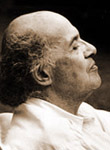Many of us at Blackbird were privileged to know Larry Levis. We all have our recollections: the car that had to be entered through the driver’s side window, the reading of “In 1967” in the middle of a crowded art opening that silenced a room, the double-jointed elbow that turned his hand in a peculiar way to hold his chin. He was our friend, and he continues to be, as Philip Levine has affirmed, one of our essential poets.
Each fall, the Levis Remembered reading loop recalls his gifts and celebrates the winner of the Levis Reading Prize. Katie Ford, the 2009 winner for her second collection of poems, Colosseum, is represented by new poems, a sampling of work from her prize-winning collection, and a recorded conversation, along with a review of her book.
We revisit aspects of Levis’s work in his poem “Linnets,” which originally appeared in his own second book, The Afterlife, and in his essay “Some Notes On The Gazer Within,” which seeks the uncanny sources of poetry, exploring the awakened inward and external landscapes that are its origins. A new bit of Levis-related “found art” rounds out the loop.
“Linnets” was Levis’s first poem of decided length, and it offers its own path into any discussion of the long poem, its amplitude and dynamism. The long poem is embedded in the genetic code of American poetry, a lineage that shuttles between the elliptical brevity of Emily Dickinson and what Charles Wright has called “the open road” of Walt Whitman. The spacious format of the online journal gives Blackbird the luxury to explore work in this longer form, and our commitment to supporting poets pushing this boundary of the genre can be traced back into our first two volumes where we published The Spirit Tablets at Goa Lake, the book-length, futurist poem by Norman Dubie.
This issue features two long poems, “I” by Gerald Stern and “Forever” by Jake Adam York. “I” is a takeoff on the biblical Isaiah and derives its setting from the lower east side of New York City and its energy from the passion, music, and observant acuity that characterize Stern’s poetry. The poem embraces the comedy that may emerge from the absurdities of circumstance and the nearly unbearable sadness that soon follows. Jake Adam York’s “And Ever” is an elegy for the assassinated civil rights activist Medgar Evers, continuing York’s quest for a tenuous redemption that may be found in an imaginative interrogation and reliving of southern history.
Other poems here take diverse paths. Lisa Fay Coutley’s “Why to Bury a Parrot” opts for an impassioned and disturbing dive, while Dawn Lonsinger offers “A Slow Saunter of Wither.” Paisley Rekdal’s meta-ekphrastic poetic meditations on works by famous women photographers follow the twists of time travel in still life; Sherman Alexie’s “Interrupted” poems bolt down rat holes and rush up from subways; Leah Dunham risks a walk through the “gritty dark” and a fall down the “throat’s white gulch” as she crosses the “Natural Bridge”; and Sofia Starnes journeys with us through multiple states of being in her “Nightlife.”
In Nonfiction, an essay by Susan Settlemyre Williams seizes the publication of Eleanor Ross Taylor’s new book, Captive Voices: New and Selected Poems, 1960–2008, as the opportunity for an examination of Taylor’s cumulative gifts to poetry over the past fifty years. In addition, an essay by Sarah Vap examines “a mothering mind and the creative process” and reviews consider new books by Anna Journey, Peter Campion, James Hoch, and more.
Fiction ranges outward in space and time, generating striking perspectives and more than a laugh or two. The trip includes the doomed web of tensions arrayed in “January” by Michele Brafman,” the poignant juxtaposition of American culture and traditional practice during an Indian call-center romance in “1-800-BUTTERBOLLY” by Adrian Dorris, the dark, sad magic of broken spells in “Cucuy” by Marcela Fuentes, and the eruption of strange, new chords in the life of an abandoned expatriate in “Americaland” by David Lynn. Included as well is the revelatory portrayal of a moment of bitter grief in the life of the brilliant and brutal Civil War figure, Nathan Bedford Forrest, in an excerpt from Devil’s Dream, a new novel from Madison Smartt Bell.
In Gallery, David Caudle’s play The Common Swallow takes on age-old questions of the return home: how do we recognize home and who takes you in when you get there? The text appears with documentation from its recent production in New York. Alan Bigelow’s Brainstrips sends us into the world of new media, collecting into a single suite three pieces that feature text, sound, layered animations, and still images that shift as a reader navigates the stories.
You are invited to roam the various paths available in this issue, for as Rilke once wrote, “The only journey is the one within.” ![]()
Return to top menus | Browse issue










